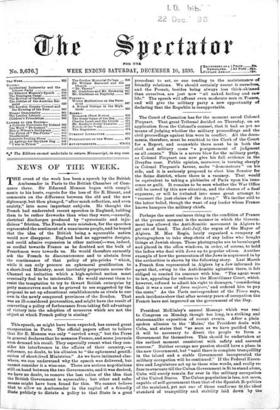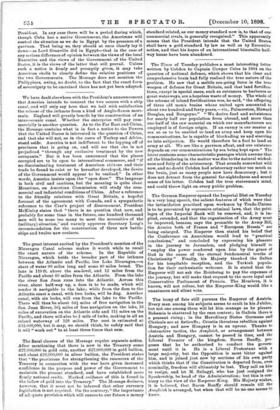President McKinley's annual Message which was reac to Congress on
Monday, though too long, is a striking and statesmanlike exposition of recent events. After a plain spoken allusion to the ' Maine,' the President deals with Cuba, and states that "so soon as we have pacified Cuba, it will be necessary to direct the people to form a Government for themselves. This should be undertaken at the earliest moment consistent with safety and assured success." Neither revenge nor passion should have a place in the new Government, but "until there is complete tranquillity in the island and a stable Government inaugurated the military occupation will be continued." If the Federal Execu- tive and Legislature act up to these wise words, and really re- fuse to evacuate till the Cuban Government is fit to stand alone, Cuba will surely remain for ever in the military occupation of the United States. The Cuban population is less, not more, capable of self-government than that of the Spanish Republics of the mainland, yet not one of those conforms to the ideal standard of tranquillity and stability laid down by the
President. In any case there will be a period daring which, though Cuba has a native Government, the Americans will control the situation as we do in Egypt by the presence of a garrison. Tbat being so, they should at once clearly lay it down—as Lord Granville did in Egypt—that in the case of any serious difference of opinion between the views of the local Executive and the views of the Government of the United States, it is the views of the latter that will prevail. Unless such a notice is firmly and promptly given, it may take American shells to clearly define the relative positions of the two Governments. The Message does not mention the Philippines, owing, no doubt, to the fact that the exact form of sovereignty to be exercised there has not yet been adopted.











































